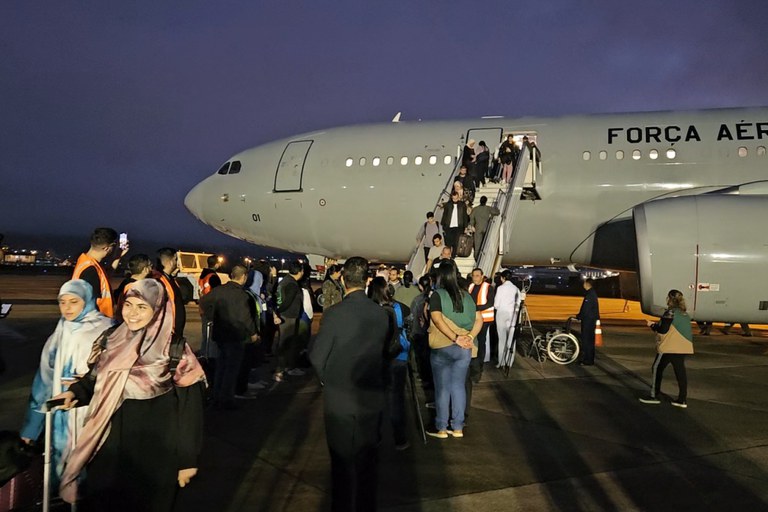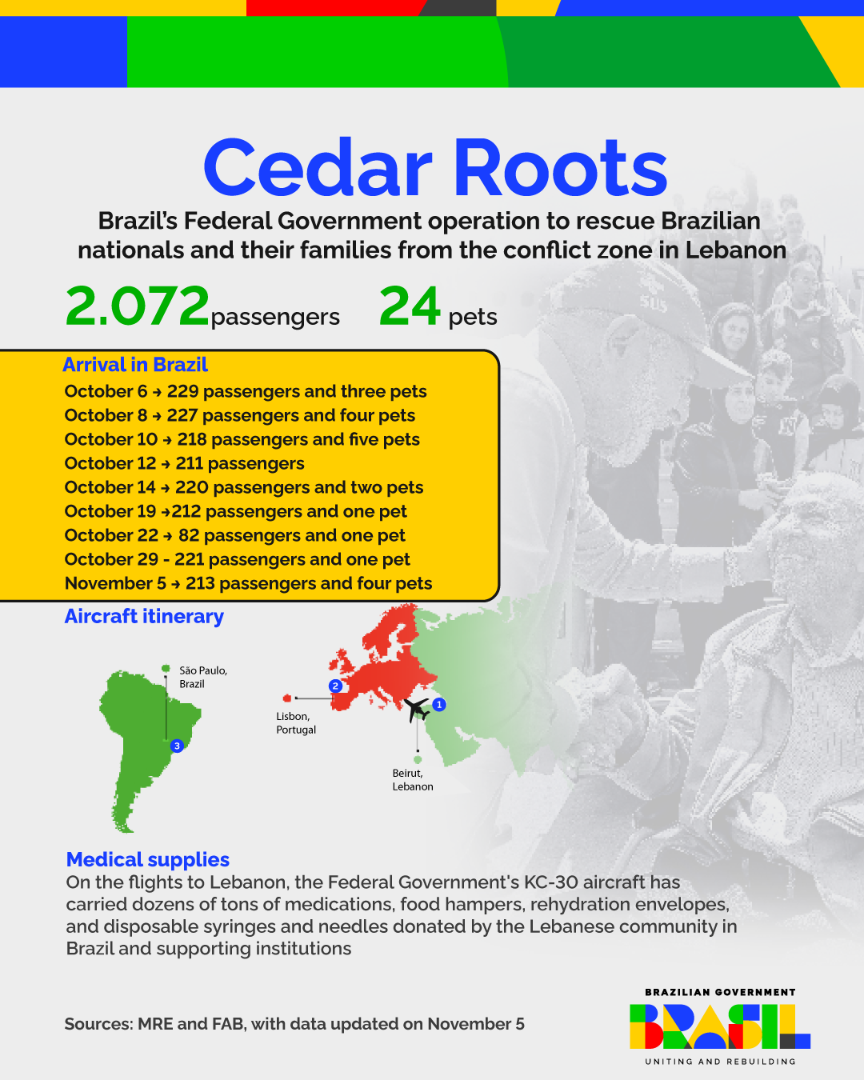Notícias
CEDAR ROOTS
Operation Cedar Roots successfully repatriates more than 2,000 Brazilian nationals and their families from Lebanon

Arrival of the tenth rescue flight of Brazilians and their families from Lebanon in São Paulo, this Tuesday, 11/5. Image: video frame / FAB
On Tuesday, November 5, operation Cedar Roots (Raízes do Cedro) — created by the Federal Government to repatriate Brazilian nationals from the conflict zone in the Middle East — reached an important milestone: it has rescued more than 2,000 nationals and their families from Lebanon. This mark was reached with the arrival, in São Paulo, of the mission’s tenth flight. The KC-30 Brazilian Air Force (Força Aérea Brasileira/FAB) plane landed at 4:06 am at the São Paulo Air Base, in Guarulhos, with 213 passengers on board, including six infants and four pets. The mission has already rescued 2,072 Brazilians and their families, in addition to 24 pets, since October 5, when the operation began.
REGRET – The Brazilian Government learned with regret and sorrow about the death of one-year-old Brazilian baby Fatima Abbas in Beirut, the victim of an Israeli attack last Saturday (November 2) in the suburbs of Hadeth, south of the Lebanese capital.
The conflict in Lebanon has already led to the confirmed deaths of three Brazilian nationals, all minors and victims of Israeli attacks. In expressing its deepest condolences to the family of Fatima Abbas and extending its full solidarity, the Brazilian Government reiterated its condemnation, in the strongest terms, of the continuous and unjustified Israeli air strikes against civilian areas in Lebanon, and renewed its appeal to the involved parties to immediately cease hostilities.
» Special page about the operation
» News about the operation on the gov.br platform

- The ten repatriation flights carried out so far by Operation Cedar Roots
INPUTS — In addition to repatriating Brazilian nationals and their families, Brazil has utilized the KC-30 aircraft to deliver emergency medical and food supplies to Lebanon. On Saturday, November 2, the Brazilian KC-30 departed with 3,734 vials of filgrastim and 146 vials of liposomal amphotericin B—oncology medications totaling approximately 90 kilograms—destined for a pediatric hospital in Beirut. This humanitarian effort underscores Brazil's commitment to supporting Lebanon amid ongoing regional conflicts. The cargo will benefit more than 4,000 children with cancer in the region. It was transported in special boxes to maintain a controlled temperature between 2°C and 8°C to guarantee the integrity and effectiveness of the products during the trip. The plane also carried basic food baskets collected by the Unidos pelo Líbano (UpL) association, adding up to 27.3 tons.
EIGHT SHIPMENTS – Operation Cedar Roots has already led to the donation of eight shipments of medicines, medical and hospital supplies, and rehydration envelopes to Lebanon from the public stocks of Brazil’s Unified Health System (Sistema Único de Saúde/SUS), managed by the Ministry of Health (Ministério da Saúde), in addition to medicines and basic food baskets collected by Lebanese diplomatic and consular representations in Brazil and donated by Brazilian companies. The donations made by the Ministry of Health respond to the demands presented by the Lebanese Embassy in Brasília last September.
NEW FLIGHTS — The Brazilian Ministry of Foreign Affairs, through its Embassy in Beirut, is in contact with Brazilian nationals and their immediate families to provide consular assistance and verify the need to arrange a new repatriation flight, depending on security conditions on the ground. The Brazilian Government reiterated its warning that everyone must follow the security guidelines of local authorities — and that those who have the resources to do so should try to leave Lebanon territory by their own means. Beirut airport is still open, with flights operated by the Lebanese company Middle East Airlines. The consular hotline numbers of the Brazilian Ministry of Foreign Affairs are available, and both on WhatsApp: +55 (61) 98260-0610 and +55 (61) 98313-0146.
WELCOME – As soon as they disembark, the Brazilian nationals and their families are welcomed by professionals working for the Ministry of Social Development and Assistance, Family, and Hunger Eradication (Ministério do Desenvolvimento e Assistência Social, Família e Combate à Fome); SUS National Force (Força Nacional do SUS); the Federal Police (Polícia Federal) and the Federal Revenue Service (Receita Federal) - details available below. During technical stopovers in Lisbon, the operation is supported by the Brazilian Embassy via the Consulate General and the Defense Attaché in the Portuguese capital.
ASSISTANCE — Upon arrival in Brazil, the families are received by specialized teams from the Ministry of Social Development and Assistance, Family, and Hunger Eradication, and the UN International Organization for Migration (IOM), which address immediate needs and assess whether people have family or social protection networks in Brazil. They also determine the need to provide shelter through the Unified Social Assistance System [Sistema Único de Assistência Social/SUAS], or temporary accommodation. For vulnerable families, the possibility of becoming part of Federal Government social programs, such as Bolsa Família, is also assessed.
HEALTH — Another group that works on welcoming those rescued from Lebanon is the SUS National Force, made up of doctors, nurses, and psychologists who provide physical and mental health care to the repatriated. The team receives a kind of manual regarding the country's customs, covering culture, behavior, clothing, language, religion, and food, providing more humane and welcoming care. The operation is divided into three axes: a reception team that welcomes the repatriated in their native language; a team with experience in emergency care placed in a strategic location, ready to assist passengers who need immediate care; and a team set up in a tent with the equipment and devices necessary to provide medical and psychosocial care. The most common kinds of attention repatriated people need are initial psychological attention and care for mild dehydration and hypertensive crises.
IDENTIFICATION — The task force for welcoming Brazilians who have been repatriated from Lebanon also includes the Ministry of Justice and Public Security (Ministério da Justiça e Segurança Pública/MJSP), which assists in the control and identification of new arrivals. The work is carried out with the support of the Federal Police and the Federal Highway Police (Polícia Rodoviária Federal/PRF).
THE OPERATION — Operation Cedar Roots was created by President Luiz Inácio Lula da Silva following the escalation of the confrontation between Israel and the Hezbollah operating in Lebanon. Repatriation logistics involve the use of aircraft and personnel from the Brazilian Air Force and intense coordination by the Ministry of Foreign Affairs.